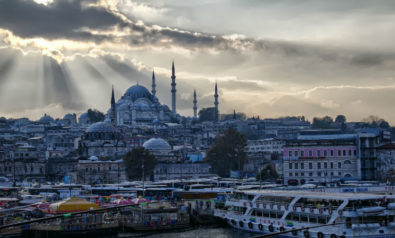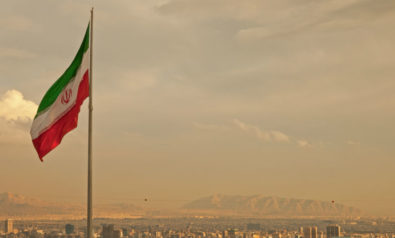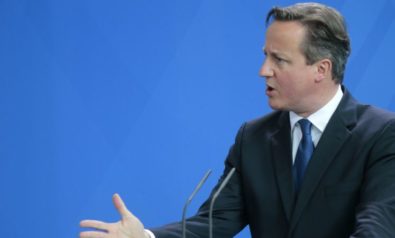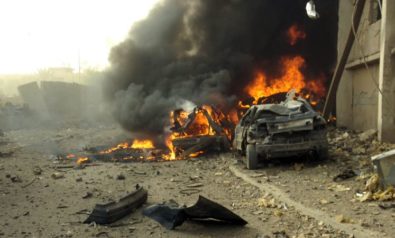To deem behavior or opinion as extremist depends on a particular point of view.
In January, a million people gathered behind world leaders who elbowed each other to be out in front of a “Je Suis Charlie” banner. When normality does not sell, as Vincente del Bosque puts it, elites cut out an increasingly radical profile. Behind them, among the masses, it looks as if intolerance is drawing a crowd.
But it begs the question, if we have civilized ourselves in part by cultivating tolerance, then why do we appear to be living in times of such virulent extremism? Are many of us so inundated with radical political viewpoints and infatuated with war that we now assume that the word “intolerant” cannot be associated with the expression of our own (Western) politically extremist views?
To deem behavior or opinion as extremist depends on a presumptive point of view. I would like to think that the preferred standpoint is one that draws from the better lessons that humanism and restoration thinking has to offer. That is to say, we should seek to foster the pursuit of common goods and rights.
At the same time, we ought to recoil from presuming to have the key to universality and from too firmly pressing our own fears into a dogmatic ideology, as evidenced in the Global War on Terror. Viewed this way, the authoritarian militarism that now often stands, nudging to make war, close to the heart of establishment politics in many Western countries finds a mirror image in militant jihadists, who do the same for Islam.
Appetite for Violence
Mohammed Tuaiman, a 13-year-old Yemeni boy, hounded by nightmares over fear of drones, became the third member of his family to be killed by a CIA drone strike earlier this year. His name was on US President Barack Obama’s “terror Tuesday kill list” because, according to anonymous US sources, he, along with two others in a car, belonged to al-Qaeda in the Arabian Peninsula (AQAP), an organization that claimed sponsorship for the Charlie Hebdo attack in Paris.
The destruction is both arbitrary and cynically precise. Hellfire missiles incinerate people who might be roughly matched to coordinates, and the ambit of the carnage permits the inclusion of ancillary targets (any male of military age in an area where “militant” organizations are said to be operating) and signature strikes (action matching an undisclosed profile of activity).
While it may at first glance appear as such, this designedly indiscriminate carnage, when it becomes hard to distinguish scorched bodies of cows and humans, strewn about at the attack site, is not incongruous with the hushed deliberations and coiffured gestures in the Oval Office. Rather, it is our perception of the look of extremism that is incongruous. By justification and end result, our work is not unlike the work of the Islamic State (IS). If at last it is not the love of violence or barbarism that distinguishes the terrorist organization’s reckless radicalism from ours, then what is it?
War State Machinery
Scholars tell us that, as a species, our tolerance and appetite for violence is declining, and that no developed countries have engaged each other in conflict since World War II. At the same time, there are significant global challenges as the American century comes to an end. According to Immanuel Wallerstein, the US has been fading as the world hegemon since 1970. Diminished in economic and cultural heft, it increasingly pulls on its military strength to assert advantage in the world system. To exercise this capacity, it would deem to be seeking and relying upon conflict and disorder, injecting billions to prop up militias, counter-insurgents and corrupt regimes that align with US interests.
To put a ribbon around this program of indeterminate hostilities, the war state machinery is now consolidated around terror, a carte blanche to seek out conflict unconfined by geographical or temporal limits. A loose coupling to Cold War dogma, the War on Terrorism is “perpetual.” In truly Orwellian tradition, such a mission cannot be fully inflated without the relentless provocation of beaten down victims into suited up antagonists. People in Iraq, Afghanistan, Syria and Libya who have lost loved ones to senseless war are poked and prodded into desperate vengeance. Impressionable sympathizers are cultivated by the massive Homeland Security budget into homegrown “terrorists,” which in everyday parlance means they are stitched up for an FBI sting operation.
A sizeable bundle of the currency of extremism has been printed by neoconservative politicians and analysts. This is a group that does not believe there are enough wars being fought, who relentlessly beat the drum for military action, be it Libya, Iran and now in Ukraine. They should be staffing a forgotten frontier outpost, but they are among the most powerful framers of US foreign policy.
In this generation, they include Samantha Power, Susan Rice, John Kerry and Hillary Clinton. In the previous administration, Dick Cheney, Paul Wolfowitz, Richard Perle and Donald Rumsfeld, among a gallery of others, were sufficiently powerful to demand intelligence community subservience in a “slam dunk” of concocted connection that would cover the military massacre of Iraq.
Having regard for the Geneva Conventions and the Nuremburg Principles and setting aside the legalisms of John Yoo, what reasonable person would not look at their agitations as extremist, and perhaps fatally destructive to the interests of all?
Populist Extremism
In Europe, people are choosing leaders that stoke populist extremism. Parties such as the Front National in France, Sweden’s Democrats, the Austrian Freedom Party and Greece’s Golden Dawn are sought out in particular by the economically insecure or unemployed, unskilled white youth. Stung by neoliberal austerity and told to expect to expect to be worse off than their parents, they have turned to blaming immigrants and cultural diversity. This is a slippery slope en route to cheerleading counterterrorism profiling, indefinite detention and preventative criminalization. It is gleefully reinforced by elites seeking to redirect domestic economic angst to an external bogeyman.
The choices being made are no better in Canada or Australia. Stephen Harper, the most radical prime minister in Canadian history, leads a government that is overseeing the comprehensive dismantling of a hard-won legacy of environment protections, social services and institutions of cultural, social and intellectual diversity—and tolerance.
At the same time, he has introduced for quick passage a new anti-terror amendment that would, according to its use of the word “unlawful,” make protest and dissent a terrorism activity and give the security service (the Canadian Security Intelligence Service, or CSIS) permission to act against the Canadian Charter of Rights and Freedoms.
In Australia, a right-wing coalition government led by Tony Abbott also seeks to sell an austerity agenda, and in the meantime, it has allocated $640 million to military and law enforcement efforts against terrorism amid larger sums to a defense budget, aimed wildly at the Middle East, following US direction.
Abbott, like populists in Europe such as Marine Le Pen, seeks to appeal to an increasingly disenfranchised constituency by stoking xenophobia, nationalist nostalgia and austerity. According to The Economist, “since the early 1970s the combined voting share of the main centre-left and centre-right parties has fallen from 91% to 67% in Germany, from 89% to 65% in Britain, and from 76% to 56% in France.” Extremism in political leadership produces radical policy choices in foreign and domestic policy—policy choices that have a real impact on people’s identities and identifications, in particular the ignorance thereof.
Public anti-radicalization initiatives like the British Home Office’s Channel program are no doubt sponsored by do-gooders who in good faith wish to interject into “vulnerable populations” some pro-British beliefs and values. At the same time, they do so by curbing presumptive freedoms in association, speech, and religion. They work largely by identifying “at risk” people and inviting them to participate in ideological or counter-extremism training programs.
They fall afoul of rights advocates because, after all, who is to decide (and on what secondary basis) that this rather than that thought ought to permit the early intervention of the state.
On paper it is a reasonable objective to stem the flow of radicalization, but in practice it means being confronted with the blowback of our own hard power projections. When we claim the right to take the fight to them, they reciprocate with the claim of taking it to us. Once started down this path, apart from the presumption of exception that then goes both ways, there is the problem of selling a program designed to convert rather than interdict the enemy.
In Australia, Abbott cannot seem to countenance spending the paltry $13 million the government has already allocated to support anti-radicalization programs.
The problem for Abbott and other right-wing governments is two-fold.
First, they are existentially opposed to adding to the public good by building up public programming. In his famous phrase referring implicitly to the public sector, Grover Norquist said of the neocons’ domestic agenda, the intention is not to maintain it or grow it, but to reduce it down to a size where “we can drown it in a bathtub.”
Second, and more importantly, they understand that fear of the “other” is what builds their party coffers. They thrive on extremism both in policy and in the cultivation of the fear that drives it: It is what builds them up and makes governments like theirs look less implausible.
Extremism per se has never been the true target of such leaders. The timing of anti-radicalization measures makes clear that they do not imagine the incitement to violence to encompass the casual jingoism in armed forces recruiting advertisements, or the bellicose remarks from State Department spokespersons that “all options are on the table” or that the death of a half million Iraqi children “was worth it.”
So when Jordan moves to hasten the execution of its captured Islamic State prisoners in retaliation for the killing of its pilot, “our” extremism gaze does not shift: It remains fixed on the video of that pilot’s execution.
This means that policy talk about religious extremism is really about the neutralization or pacification of a presumptively distinct, if nascent, cohort or group. So, while extremism is found everywhere in the propriety of culture, economics and politics, in our imagination it still somehow refers exclusively to the “other”—the pariah, the outcast, the stranger.
Extremism, a carnival brought in overnight by an ill wind, is now loudly settling in. Proclaiming itself in a cacophony of shrieks, the braying and shouting coming in everywhere. People blinded by vengeance, greed and shrill careerism scream for that radical medicine. You know the one. The one offering cheap thrill rides in, you name it: international affairs, economics and cultural institutions.
Give us more war, austerity and intolerance, they lustfully bray. In Europe, those (very few) newspapers that did not run a supportive feature and the cartoon depicting a grieving Prophet Muhammad proclaiming to be Charlie Hebdo were attacked for their failure to lend a hand in projecting provocation as the prevailing sentiment. Cautious and moderate voices are buried under the din.
Our extremism, we rush on toward it.
The views expressed in this article are the author’s own and do not necessarily reflect Fair Observer’s editorial policy.
Photo Credit: Boscorelli / Frederic Legrand – COMEO / Shutterstock.com
 We bring you perspectives from around the world. Help us to inform and educate. Your donation is tax-deductible. Join over 400 people to become a donor or you could choose to be a sponsor.
We bring you perspectives from around the world. Help us to inform and educate. Your donation is tax-deductible. Join over 400 people to become a donor or you could choose to be a sponsor.
Support Fair Observer
We rely on your support for our independence, diversity and quality.
For more than 10 years, Fair Observer has been free, fair and independent. No billionaire owns us, no advertisers control us. We are a reader-supported nonprofit. Unlike many other publications, we keep our content free for readers regardless of where they live or whether they can afford to pay. We have no paywalls and no ads.
In the post-truth era of fake news, echo chambers and filter bubbles, we publish a plurality of perspectives from around the world. Anyone can publish with us, but everyone goes through a rigorous editorial process. So, you get fact-checked, well-reasoned content instead of noise.
We publish 2,500+ voices from 90+ countries. We also conduct education and training programs
on subjects ranging from digital media and journalism to writing and critical thinking. This
doesn’t come cheap. Servers, editors, trainers and web developers cost
money.
Please consider supporting us on a regular basis as a recurring donor or a
sustaining member.
Will you support FO’s journalism?
We rely on your support for our independence, diversity and quality.




















Comment